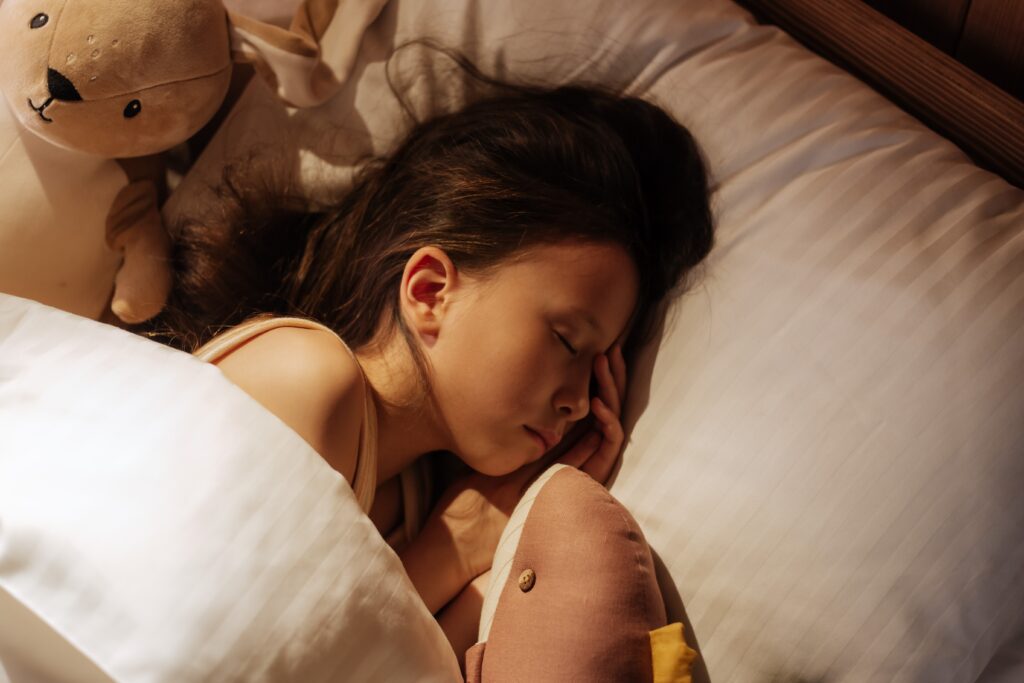Can I Give My Child Melatonin?
February 28, 2023

Trouble falling and staying asleep are common problems for children of all ages. Parents are often desperate for a solution to help their children sleep better. By the time parents come to a healthcare provider or sleep consultant, they will have tried many different things often including melatonin supplements. In this process of figuring out sleep issues, parents will often ask – is it safe to give my child melatonin?
Today, we’re deep diving into what melatonin is and why it’s important. We’ll look at what the data and experts say about giving it to little ones and finally, how to harness the power of our natural melatonin.
What Is Melatonin?
Melatonin is a hormone-like substance produced by the pineal gland in the brain. It’s released naturally at night and signals to the body that it’s time to sleep. You can also find melatonin sold as an over the counter (OTC) sleep aid. It comes in various doses that are aimed at children and adults alike. The most important thing to know about OTC melatonin supplements is they are not regulated by the FDA. This means that the contents of the supplement are not regulated nor have the safety and effectiveness been evaluated.
Why Is Melatonin Important?
Melatonin plays an important role in sleep. The pineal gland produces melatonin when it’s dark out. It helps regulate the circadian rhythm (aka the body’s 24 hour clock) and promotes quality sleep.
Safety Data Of OTC Melatonin
Melatonin is generally considered safe for short-term use with few risks. Possible side effects of melatonin in kids can include bedwetting, drowsiness, agitation, and headaches. Unfortunately, there is little data available about long-term safety and outcomes. Some experts worry that because melatonin is a hormone-like substance, that if taken OTC, it may affect hormonal development in teenagers.
A recent study from the CDC found that accidental melatonin ingestion in children increased 530% between 2012 and 2021 resulting in an increase in the number of calls to poison control. This study found that 84.4% of children were asymptomatic. The children who were symptomatic had symptoms affecting the cardiovascular, gastrointestinal, or nervous systems. The majority of the children (71.6%) who presented to the hospital were discharged without the need for hospitalization and without serious health outcomes. All this to say that, melatonin is unlikely to cause serious harm, but if you have melatonin at home, whether for yourself or a child, it should be safely stored.
Is It Okay To Give My Child Melatonin?
You should always check with your child’s pediatrician first. There are some situations where melatonin may be used short-term, particularly in older children, such as after vacations or summer breaks. Pediatricians may also recommend melatonin in children who have autism or ADHD.
For most children, melatonin is not recommended. The best solution to a child’s sleep issue is often a solid bedtime routine and healthy sleep habits. However, experts say that melatonin may be beneficial in some children, especially if accompanied by a behavioral intervention to address sleep issues. The bottom line here is generally most children do not benefit from melatonin alone to help correct sleep problems. In addition, we don’t have great long-term safety data.
How To Harness The Power Of Natural Melatonin
The good news is that we can all work towards optimizing our production of natural melatonin. As we’ve learned, melatonin production is triggered by darkness. Consequently, production is slowed or turned off when we’re exposed to light. This means setting up good routines in the evening can help us work together with our circadian rhythm and natural melatonin production.
It’s important to maintain a consistent sleep schedule for your child. Generally your child, should go to bed and wake up at the same time each day. I recommend keeping their bedroom dark and cool. Limiting screentime in the evenings is very important too. Ending television, tablets, video games 1-2 hours before bed will help limit exposure to blue light which can interfere with natural melatonin production.
If you’re struggling to help your child establish healthy sleep habits or your child is struggling to fall asleep or stay asleep, I invite you to reach out to me or check out my services here.
References:
HealthyChildren.Org – Melatonin for Kids: What Parents Should Know About This Sleep Aid
CDC – Pediatric Melatonin Ingestions
National Institutes of Health – Melatonin: What You Need To Know